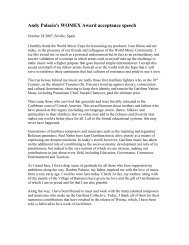WOMEX 11 Guide
WOMEX 11 Guide
WOMEX 11 Guide
Create successful ePaper yourself
Turn your PDF publications into a flip-book with our unique Google optimized e-Paper software.
Who‘s Playing Whom?n e t w o r k© Kim Jacobs“Political leaders have long understood the power thatcomes from attraction. If I can get you to want to dowhat I want, then I do not have to use carrots or sticksto make you do it... The ability to establish preferencestends to be associated with intangible assets suchas an attractive personality, culture, political valuesand institutions...” 1 Joseph Nye, Kennedy School ofGovernment, Harvard University“Cultural diplomacy is the linchpin of public diplomacy;for it is in cultural activities that a nation’s ideaof itself is best represented. And cultural diplomacy canenhance our national security in subtle, wide-ranging,and sustainable ways. Indeed history may record thatAmerica’s cultural riches played no less a role thanmilitary action in shaping our international leadership,including the war on terror. For the values embedded inour artistic and intellectual traditions form a bulwarkagainst the forces of darkness.” 2 Advisory Committeeon Cultural Diplomacy, US State Dept.“The usual position of governments to culture is as to acharity – something they are compelled to throw smallamounts of money at so they don’t get shouted at.”Simon Anholt, International Policy AdvisorGovernments love us world music artists, and rightlyso. What’s not to like? Wholesome, positive and asreliable as the family dog: when you’re feeling a bitdepressed, and there are clouds gathering over yourneighbourhood, world music can be relied on to makeeveryone feel good, both about themselves and aboutyou too. We don’t tend to be loud or aggressive; half ofwhat we do is instrumental and looks as pretty as ournational dress; and as for the other half, the songs aremostly about waiting for a lover in a barn or a group ofWho’s Playing Whom?Cultural Diplomacy and World MusicBy Lemez Lovas (UK) | Producer, Lyricist, Artistfriends coming together as one, and anyway most of thepeople we play to can’t understand the lyrics anyway. 3We don’t make too much money or promote obscenevalues, and as long as we sound different enough fromour neighbours and don’t mind waving the flag, ourpolitical leaders – regional or national – will be happyto adopt our music and send us abroad to spread themessage of what it is that our great corner of the globestands for. For a brief moment, whatever else ourhonoured representatives might have done that peoplemight not like will be forgotten, and other nations willrespect ours for its creativity, humanity and diversecultural traditions.We could be forgiven for pinching ourselves. The musicbusiness claims to be in a crisis, and those who aren’tin crisis are keeping quiet to save money. It’s gettingmore and more difficult for world music artists to getsigned, distributed and launch an international careerfor themselves, and even if you get lucky, tough visaprocedures and lower fees are making it harder thanever to tour an average-sized band. So the current loveaffair between regional and national government andworld music artists has, one might argue, come at a veryuseful time indeed. World music is now a key plank in– whisper it – ‘cultural diplomacy’.“I prefer the term ‘cultural relations’,” says policy advisorSimon Anholt, “‘cultural diplomacy’ sounds very elitistto me, as if you are doing something weaselly amid highlevel negotiations to persuade other elites your cultureis worth paying attention to. What you try to do is toget people in other countries to know about and to likeyour culture – whatever culture means.”British Council Music Director Cathy Graham agrees:“We are in the business of creating a dialogue. Differentgovernments have different reasons for doing culturalrelations work – most governments understand thevalue of people to people rather than government togovernment engagement, and direct contact with thepositive bits of each other’s culture can do a lot ofgood.”This year’s storm over the Wikileaks cables meansthat 20<strong>11</strong> hasn’t been a great year for the image ofdiplomacy, but semantics aside, cultural diplomacyseems to be on the up. The concept of attraction asbeing a more effective form of international relationsthan coercion may have been around for centuries, butit has taken until last year for it to become a centralpart of UK foreign policy. Put plainly, in an age ofsevere budget cuts and messy international militarycampaigns, the ‘soft power’ arsenal of culture, values,policies and institutions is both more palatable at homeand abroad, and a lot cheaper too. The era of ‘heartsand minds’ in international relations has well and trulyarrived – and music is a crucial tool in the diplomatichandyman’s toolbox.“There is a dumb, old approach,” continues Anholt,“which is basically culture promotion, putting a lot oftaxpayer’s money into sending out art exhibitions andtouring orchestras and forcing people in other countriesto swallow your culture. There is also an intelligent,modern approach, such as the one taken by the BritishCouncil among others, based on mutuality. Ratherthan trying to project a stream of culture, it’s aboutdoing culture together with people in other countries,so that they are enriched by us and we by them.”Top American jazzmen featured heavily in US diplomacyat the height of the Cold War – Benny Goodman’stour to Russia in 1962 and Louis Armstrong and DukeEllington going to Africa in the fifties and sixties, atradition continued by artists like Wynton Marsalis inmore recent times. Classical music has an illustriousdiplomatic history too, from Italian Jesuit MatteoRicci’s present of a clavichord to Ming Emperor WanLi in 1607, to the New York Philharmonic’s trip toPyongyang in 2008. In world music, however, theAmerican outreach flag these days is being flown by LosAngeles multi-ethnic rock/hip-hop band Ozomatli.The band might seem like an unusual choice fordiplomatic envoys – they met at the city’s Peace andJustice Center, first performing for picketers at a strike,and were approached by the US State Departmentduring the Presidency of George W. Bush. The need tocombat the swift rise in anti-Americanism at the timefound a perfect partner in a band who may not haveagreed with US policies, but who projected values thatshowed a positive, alternative side of American culture.However, it wasn’t an easy courtship for either party.“The US Embassy in India, which is our third largest,was asked by someone at the State Department to lookat bringing us out,” says band manager Amy Blackman.“It took them a couple years to convince the embassy– they had a lot of concerns about the band’s politicalmessage, as we were very outspoken about the Bushadministration and the Iraq war, and they thought wewere too rebellious for this kind of interface. When wefinally got the call from India, it took me months toconvince the band. They were like ‘no way, we hate thegovernment and we won’t dialogue with them.’ I justkept on and on at them, and since then we’ve been sentall over the world.” Local embassy officials abroad were,the band discovered, not so different in outlook tothem, and now the mutually beneficial relationship hasevolved to such an extent that the only places the bandwouldn’t go to are those where “security is an issue.”Herein lies one potential issue with artists taking on thebadge of foreign diplomats: Ozomatli were approachednot for their music alone, but because it came packagedwith a story of cultural fusion, tolerance and diversitythat was right for a country with a serious imageproblem. “What happened during the 2 nd Iraq war,“says Colin Hicks, “was that George Bush forgot thecentral tenet of diplomacy – the reputation of yourcountry is your major asset.” Hicks is a cultural brokerwho spent 18 years as the Cultural Attache for theQuebec Government Office in London. One problemof cultural diplomacy he sees is that what governmentswant out of musicians and what constitutes the bestavailable art is not necessarily the same thing.n e t w o r k Who‘s Playing Whom?8687







